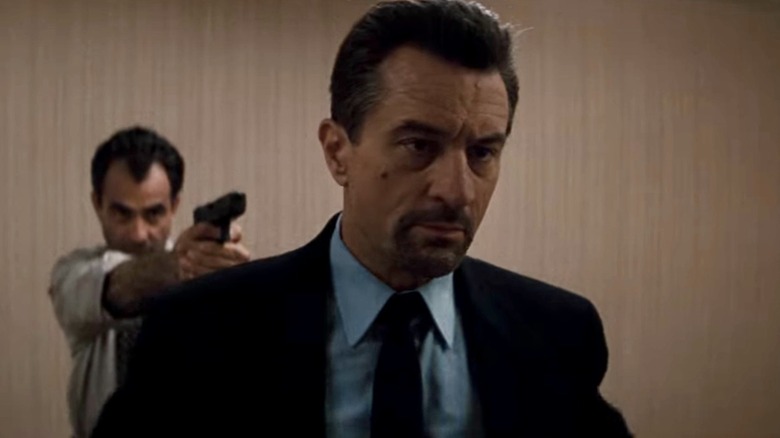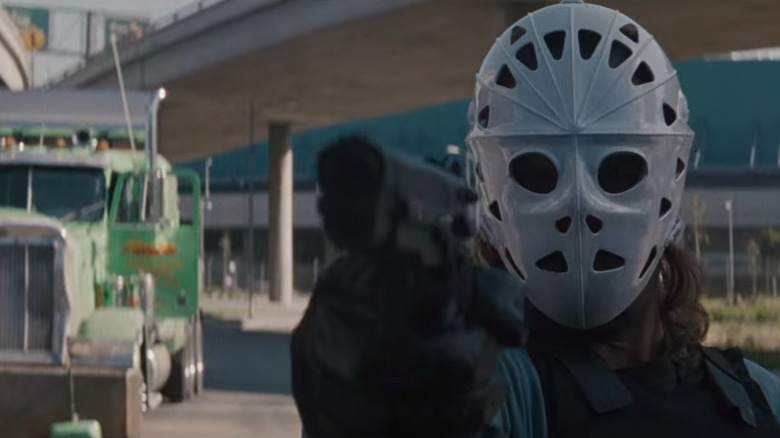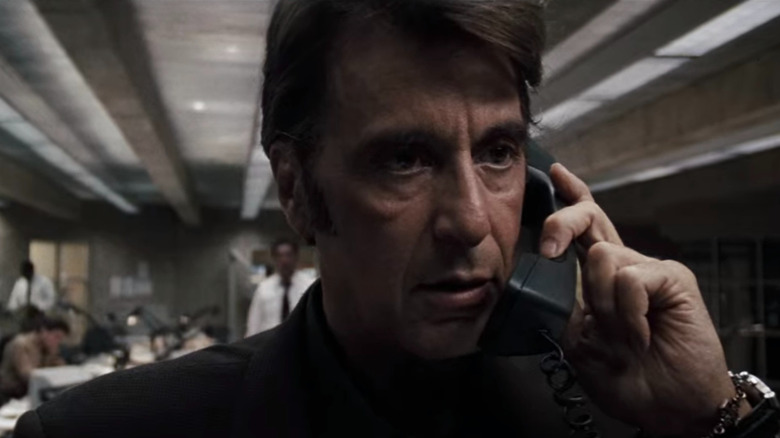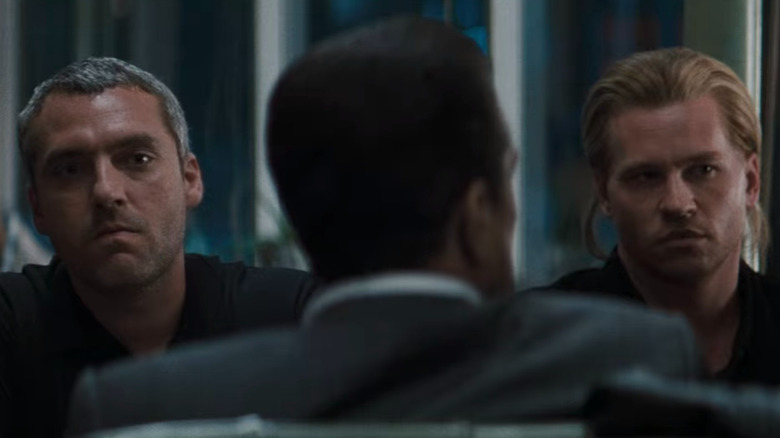
(Welcome to The Daily Stream, an ongoing series in which the /Film team shares what they've been watching, why it's worth checking out, and where you can stream it.)
The Movie: "Heat"
Where You Can Stream It: Pluto TV
The Pitch: An armored car robbery gone wrong puts a police lieutenant and a career thief on a collision course in Michael Mann's sprawling Los Angeles crime saga.
One of the early action beats in "Heat" sees a gang of crooks donning hockey masks like slasher villain Jason Voorhees as they literally knock over said armored car with a semi-truck. Character deaths in action movies are not so different from those in horror movies: they mean more when we've actually spent time getting to know the faces involved.
With a running time of 170 minutes, "Heat" is the consummate crime drama, a movie that brings two hours of character development into its famous bank robbery and street shootout so that it inspires more ripped-from-the-headlines terror when someone takes a bullet, or when a guy we've seen laugh with his family suddenly takes a kid hostage while his partners unload automatic rifles on the street in broad daylight. That sequence and the movie in general influenced Christopher Nolan's "The Dark Knight," which even utilized William Fichtner, one of the many great character actors in "Heat," for its opening scene.
The premiere of "Tokyo Vice" this week has brought the first new directorial work from Mann since he helmed "Blackhat" in 2015 and the pilot of HBO's "Luck" in 2011. It's a good excuse to go reaching back into his filmography, which begins with "Thief" and peaks with "Heat." This film was the centerpiece of an especially strong three-movie run that Mann had in the 1990s, starting with "The Last of the Mohicans" and culminating in "The Insider" and its multiple Oscar nominations.
Why It's Essential Viewing

In "Heat," Mann assembled an unparalleled cast for the ultimate game of cops and robbers. Shot entirely on location in L.A. (as opposed to some studio backlot there), the movie distinguishes itself from other run-of-the-mill crime flicks through its scope and attention to character drama. Mann's sweeping vision juxtaposes scenes of men on both sides of the law with their wives and personal lives outside the bursts of action and gunplay. Yet it does so in a way that feels rooted in real-life stories and not just cinema clichés.
Though the title leans warm, "Heat" is equal parts fire and ice, as embodied by Al Pacino and Robert De Niro, two acting legends who need no introduction. Their careers had long run parallel to each other, even once in the same mob-movie family. In "The Godfather Part II," their characters inhabited different time frames and never crossed paths, scene-wise. "Heat" put them "together again for the first time," as the saying goes. It let them finally trade dialogue in a historic matchup that also managed to juggle screen time for Val Kilmer and a massive ensemble with too many good actors to enumerate in full.
"Heat" is a true time capsule of '90s talent, with several other recognizable members of its Major Crimes Unit — Wes Studi, Ted Levine, and Mykelti Williamson — branching out to films from that era such as "Dances with Wolves," "The Silence of the Lambs," and "Forrest Gump." They're the good guys here, but as with other modern crime classics like "The French Connection," "Heat" shows the thin line between cop and criminal. There's more to it than simple white hats and black hats, per the aforementioned Mann film.
In "The Devil's Advocate," which followed two years after "Heat," Pacino went on record (as the Devil) to say, "I'm a fan of man!" He was talking about humankind, but let's just pretend he doubles as "a fan of Mann" and was encouraging the viewer to revisit "Heat."
Hanna And McCauley

Of the two lead performances in "Heat," Pacino's is the flashier one, in keeping with the tactics of a hotshot detective who wants to keep his informants on edge (along with the audience). Lieutenant Vincent Hanna bridges the gap between Pacino's upright, well-intentioned cop in "Serpico" and his older, wearier, more manifestly flawed detective in "Insomnia."
Hanna's wife, Justine, played by Diana Venora ("Romeo + Juliet"), observes that he "lives among the remains of dead people." He's watching his third marriage disintegrate due to his own neglect and obsession with chasing murderers. His stepdaughter, played by a young Natalie Portman, is caught in the middle, and she's just one of the many side characters who populate the snaking subplots of "Heat." Another is Breedan (Dennis Haysbert), a parolee stuck working an exploitative diner job, who gives a human face to the usual shoot-'em-up casualties when he agrees to be the getaway driver for the robbery.
1995 was maybe the last great year of Robert De Niro's career. "Casino" and "Heat" hit theaters within weeks of each other, and they teed up his transition from a leading man, whose name had become an event-level marquee draw in the 1970s, to more of an elder statesman who would fade to the background a bit in the comedy slums and in various supporting roles as fathers or grandfathers. De Niro would still appear in some good films after 1995, working with auteurs like Quentin Tarantino and David O. Russell, but his track record became much more uneven.
"Casino" marked the end of De Niro's initial eight-film collaboration with Martin Scorsese, who found a new muse with Leonardo DiCaprio in the 2000s and would not reunite with De Niro until almost a quarter-century later when they teamed with Pacino for "The Irishman." As Neil McCauley in "Heat," De Niro projects an aloof, business-like demeanor, similar to his buttoned-up, controlling casino manager, Ace Rothstein, in Scorsese's film. Like the actor himself, McCauley is a master of his trade, but that comes at the cost of human relationships.
Thirty Seconds Flat

The other members of McCauley's crew are capable of maintaining marriages, but they're also ruthless in their criminal efficiency and menacing to civilians, with Cheritto (Tom Sizemore) poking his head out from the diner booth, daring a guy who's bigger than him to challenge them as they cause a violent commotion. The title of "Heat" stems from a line of prison-yard sagacity that McCauley repeats:
"You want to be making moves on the street, have no attachments. Allow nothing to be in your life that you cannot walk out on in thirty seconds flat if you spot the heat around the corner."
Amy Brenneman's character, Eady, manages to penetrate McCauley's walled-off existence, and as they grow closer, he tells her, "I'm alone. I am not lonely." Intimate character moments like this, or the final wordless warning from Charlene (Ashley Judd) to her fugitive husband (Kilmer) have kept "Heat" memorable long after the hot streaks of some of the creative people behind it have cooled.
In "Collateral," another gripping Mann film set in L.A., Tom Cruise's steely hitman lamented that the city was "too sprawled out, disconnected." At times, the narrative of "Heat" mirrors this aspect of the city, but Mann keeps everything interconnected and shows how his characters and their micro-stories come together in a larger incident where not everyone will make it out alive.
Back in '95, "Heat" opened in third place behind "Jumanji" and "Toy Story." In the intervening years, the market for adult dramas or action thrillers that rely on performances and practical stunts over visual effects has shrunk even more. Usually, films of that nature now head straight to the streaming wild, to live or die based on the whims of algorithmic recommendations. It might be a trite observation, but they don't make enough movies like "Heat" anymore.
Read this next: The Daily Stream: Genre-Bending Series Dickinson Is Pure Imagination
The post The Daily Stream: In Heat, Michael Mann Explored the Spaces Between the Typical Crime Film Shootouts appeared first on /Film.
0 Commentaires